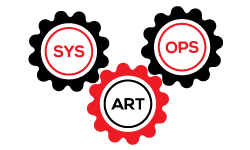Introduction
Troubleshooting systems is an essential skill for IT professionals, enabling them to quickly identify and resolve issues, ensuring smooth and uninterrupted operations.
Mastering the art of troubleshooting can transform you into a problem-solving hero, capable of navigating the complexities of modern technology with confidence and precision.
The Troubleshooting Mindset
- Remain Calm – Trying to resolve an issue while in the wrong mindset can cause more problems. Take a deep breath.
- Gather Information – Review information provided and attempt to reproduce the issue. Then try to gather new and additional information.
- Hypothesize – Using the information gathered, take your best guess at the issue and then look for supporting evidence.
- Fix – Attempt to fix the issue and then confirm the issue has been resolved by trying to reproduce the problem once more. If it doesn’t work, circle back again. Gather more information, hypothesize and fix.
Gathering System Information
uptime – System uptime, number of users logged in & load average in 1, 5 and 15-minutes incrementsdf – Disk Space Usage Information – filesystems, available space, percentage of used space and location of filesystem mounts. free – Free and used memory and swap settings and usage. -m (megabytes), -g (gigabytes), -h (human readable format).lsof – How many files we have open compared to our open file limits. The lsof command displays a list of open files. To gain a count of this, we can pipe ( | ) the results to the word count command (wc) and count by lines (-l). e.g. lsof -u admin | wc -ltop – List of running processes updated live.ss– Dumps sockets statistics. ss -lpt (Provides us with a list of listening tcp processes; -l listening, -p process, -t tcp). If we were troubleshooting, we would be looking for a missing connection. For example a service which is supposed to be listening for TCP connections. Or one that is suspicious in nature.ps – Displays process information. ps aux – all server running processes for all users and others that are not attached to a tty .
Troubleshooting Server Performance Issues
When dealing with server performance issues, the common question is: “Why is the server so slow?” The answer typically lies in resource consumption. This guide will help you identify and troubleshoot various performance bottlenecks.
Understanding Server Resources
A slow server usually indicates maximum consumption of one or more of these key resources:
- CPU
- RAM
- Disk I/O
- Network bandwidth
Essential Diagnostic Tools
1. System Load Average
Understanding load average is crucial for performance troubleshooting. It indicates:
- Active processes using resources
- Whether the load is:
- CPU-bound (processes waiting for CPU)
- RAM-bound (high RAM usage leading to swap)
- I/O-bound (processes competing for disk/network I/O)
💡 Pro Tip: I/O-bound systems are typically less responsive than CPU-bound ones, often making even basic login attempts slow.
2. Using top Command
top provides real-time system monitoring, showing:
- System uptime
- Load averages
- Process count
- Memory statistics
- Resource usage by process
Key Features:
# Basic usage
top
# Batch mode with specified iterations
top -b -n > top_output
Understanding CPU Metrics
The %Cpu(s) section in top shows:
| Metric | Description |
|---|---|
| us | User CPU time |
| sy | System CPU time |
| ni | Nice CPU time |
| id | CPU idle time |
| wa | I/O wait |
| hi | Hardware interrupts |
| si | Software interrupts |
| st | Steal time (VM environments) |
Diagnostic Process
1. Checking System Health
- Monitor I/O wait
- Check idle percentage
- Analyze user CPU time
- Review process list
2. Memory Issues
Monitor these key indicators:
- Physical RAM usage
- Swap usage
- File cache usage
🚨 Warning: High swap usage combined with low file cache often indicates memory problems.
3. I/O Problems
Tools for I/O diagnostics:
iostatiotopfree -mswapon -s
Historical Analysis with sysstat
Setting Up sysstat
- Install the package
- Enable the service
- Configure retention period
Using sar Commands
# View CPU stats
sar
# RAM statistics
sar -r
# Disk statistics
sar -v
# All statistics
sar -A
# Specific time period
sar -s [start_time] -e [end_time]
Best Practices
- Regular monitoring
- Baseline establishment
- Proactive resource planning
- Documentation of issues and solutions
Conclusion
Understanding server performance requires systematic analysis of various metrics and resources. Regular monitoring and proper tooling can help prevent and quickly resolve performance issues
